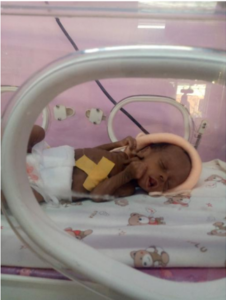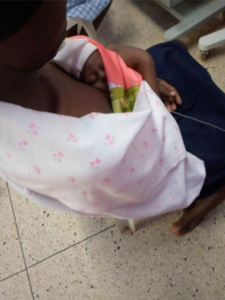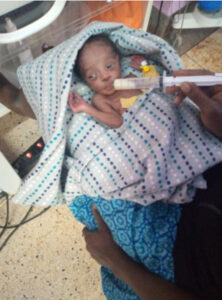Photo Credit: Kettie Bagamba

In the Makindye Division in the heart of Kampala, where life is simple yet challenging, a remarkable story of resilience, love, and triumph unfolded –the story of baby Peter*, a premature baby born to a young mother, Mary*, and her devoted husband, John*. The challenges Mary and John faced and the journey they undertook to secure the health and future of their newborn child exemplify the power of human spirit and the impact of accessible health care services, even in the most remote regions.
Mary, a young pregnant woman from Masaka, aged 18 years old, attended her first ANC visit at four months from Kisenyi Healthcare Centre IV. The Save the Children Saving Women and Premature Babies (SWAP) project supports the Kisenyi Healthcare Centre IV with technical assistance in continuing these initiatives.
Shortly after her first ANC visit, Mary developed abdominal pain resulting from a urinary tract infection which lasted more than one week. She reported to a clinic in Makindye near her current residence with her husband John, but she received no help nor any medication. No urine test nor scan were done at the clinic to understand the problem ; “I experienced a lot of pain below my stomach” said Mary. After a while of experiencing pain, Mary made her way back to Kisenyi Healthcare Centre IV, where she was given some treatment and she felt better for a time.
At six months of pregnancy, Mary started to feel the same symptoms she had before. When the pain re-surfaced and this time, Mary, with the help of her husband was rushed to the nearby Ebenezer clinic, where she delivered her son Peter at 28 weeks of pregnancy. Baby Peter only weighed a mere 1.2kgs and was immediately faced with the challenges of preterm birth. Not knowing what to do, the healthcare provider at the Ebenezer clinic immediately referred baby Peter, Mary and her husband John back to Kisenyi Healthcare Centre IV.
While at Kisenyi Healthcare Centre IV, in the quiet moments of the neonatal ward, where monitors hummed and tiny fingers grasped, there was a promise of tomorrow for Peter. The dedicated health care team at the facility worked tirelessly to stabilize baby Peter by providing the necessary neonatal care. At this point, baby Peter still weighed 1.2kgs. On the 10th day after admission, the baby’s weight reduced to 1.098kgs. At this moment, Mary was devastated, with no hope and only wished she could leave the facility since she barely had a caretaker with her in that moment. The health workers encouraged Mary to express breast milk, provided counselling to her, and also encouraged her, assuring Mary that her baby would get well. The healthcare providers and the SWAP project based clinical mentor also provided counselling to John, the father.

But Mary was also dealing with continued challenges of her own. After delivery Mary had some pain in her stomach that left her feeling unsettled, disgruntled and helpless. “After the birth of my son, I still had some pain in my stomach. I was very unsettled during my admission at the facility; I was walking around the entire facility just to ensure that my pain calmed down,” said a tearful Mary. Her pain finally came to an end when she spoke to one of the health workers and told them what she was going through. It was then determined the pain was due to retained gestational tissue and an evacuation procedure was done immediately to remove the infected tissue.
Meanwhile, the baby was given antibiotics and caffeine among other medications and was put on a Vayu continuous positive airway pressure (CPAP) device for at least 3 weeks to treat respiratory distress. Vayu bCPAP is a high-quality newborn and infant bCPAP system that does not require electricity, compressed medical air, or manual power to operate and used to treat respiratory distress syndrome in newborns. Mary also diligently practiced kangaroo mother care (KMC) with Peter. Mary stayed on the ward for one month and 15 days while Peter was being cared for. At this point, Mary was then discharged and asked to return after two weeks to the facility.
During the discharge time, Mary decided to visit her mother in Masaka, a city and district in the Buganda Region in southern Uganda, west of Lake Victoria. The two weeks approached but she did not honor her appointment. One of the clinical mentors attached to Kisenyi made a phone call to Mary’s husband John asking them to come to the facility. In his response, he said; “I don’t have money yet to bring my wife back to Kampala but I will come after another two weeks.” At this point, not much could be done, but only to wait for John to send some money to Mary for transport. After one month, Mary returned together with John to the facility to see a doctor. Meanwhile at Kisenyi, baby Peter presented with signs of anemia and was immediately transfused and also given other medication.
Despite the joy of Peter’s birth, the family faced an uphill battle. John, a motorcycle taxi driver, struggled to cover the costs of essential medical tests and neonatal care for their fragile son. The health facility recommended a series of tests, including blood tests and screenings for common preterm complications, but the family’s limited financial resources seemed insurmountable. John and Mary’s determination, however, was unwavering.

The patients in Kisenyi Healthcare Centre IV rallied behind baby Peter, Mary, and John, offering financial support, supplies, and assistance with transportation to a larger health facility that could provide the necessary medical tests and care. With the generosity of these people and the dedication of the healthcare staff, baby Peter received the critical screenings, treatments and follow-up care he needed to thrive. Over time, his health has improved, and he surpassed all expectations for a preterm baby. Today, he continues to receive treatment as an outpatient and is breastfeeding well.
.